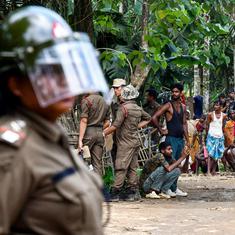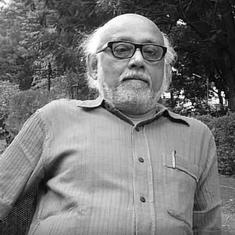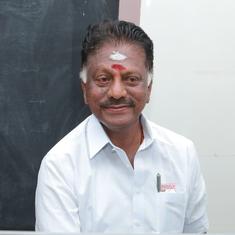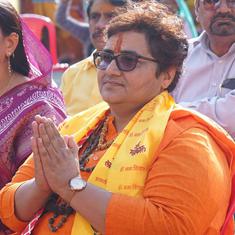Disney’s March 17 release Beauty and the Beast, a live-action remake of the animated film from 1991, combines the classic French fairy tale with modern technological chutzpah. Despite the newfangled trappings, the tale itself – as Celine Dion crooned in the title track of the animated film – is as old as time.
In the original French fairy tale La Belle et la Bête, written by Gabrielle-Suzanne Barbot de Villeneuve in 1740, a handsome prince is cursed into looking like a beast because of his selfish inability to look past appearances. After a beautiful woman is forced to stay in the beast’s mansion, she falls in love with him despite his monstrous face and quick temper. Their mutual love reverses the curse and the beast transforms back into his attractive self.
Considering Hindi cinema’s abiding love for drastic transformations and dedicated women, it is not surprising that this trope appeared in our movies long before Disney produced its animated adaptation.
In Aag (1948), self-righteous theatre director Kewal is taken aback when he realises that the star actress of his troupe has fallen in love with him merely because of his looks. Anguished for his friend who also loves the actress, Kewal disfigures his face. The actress is put off by his altered appearance, and Kewal serendipitously winds up married to his childhood sweetheart.
Aag is more about Kewal’s journey towards disfigurement than his eventual redemption from it. Although his bride’s fear of his appearance transforms into love after he narrates his story, Kewal’s personality remains unaltered.
The beast is unable to move about in society because his personality doesn’t adhere to conventional ideas of normalcy and beauty. He finds companionship only when he forces a woman to live with him. Like the beast, mentally challenged men in Hindi films are often locked away, finding lasting companionship only when women are compelled to marry or treat them.
In Bahurani (1963), fierce and capable Padma is unruffled even after she finds herself married to mentally challenged Raghu. When she learns that he has been pushed into retardation because of the opium that Raghu’s stepmother fed him as a child, she undertakes a campaign to cure him of his condition. Several medicines, assorted tantrums and a pile of books later, Raghu emerges a well-spoken and intelligent man.
With a heroine who pulls no punches while rescuing the hero, and a male protagonist who cherishes his wife’s intervention, Bahurani is gratifyingly ahead of its time. The film was the inspiration behind Jyothi (1981), but the whip-wielding Gauri of the remake lacks Padma’s quiet conviction, and the sweeping change she effects in her husband Govind is comically drastic rather than sweetly satisfying.
Since the trope has a beautiful woman transforming a monstrous man at tremendous personal cost, it has frequently been accused of promoting regressive ideas. In Khilona (1970), Vijaykamal loses his sanity when the love of his life plunges to her death. Since doctors believe that a spouse’s love (presumably a euphemism for bedroom activities) will cure him, courtesan Chand is hired to masquerade as his wife. Chand remains slavishly devoted to Vijay and his family even after he rapes her. When she is accepted as a member of the family, she is overcome with the kind of joy only Hindi film characters are capable of feeling.
In Ishaqzaade (2012), Zoya is saddled with Parma even after he lures her into having sex with him and leaks photographs of their interlude, because his mother is convinced that Zoya’s love will make a man out of her monstrous son.
It has also been argued that the beauty wasn’t in love with the beast as much as she was a victim of Stockholm syndrome, feeling a pathological sense of gratitude for a captor who treated her with respect. But this is often seems too tame an explanation for the depth of the attachment between beastly kidnappers and beautiful captives in some Hindi films.
In Mujhe Jeene Do (1963) dacoit Jarnail Singh abducts courtesan Chameli purely with the intent to posses her, but is moved by her indomitable spirit. They get married and Jarnail attempts to reform after the birth of his child. In Raavan (2010), adored revolutionary Beera abducts Ragini, the wife of a police officer, but is struck by her fearlessness. Although he is vocal about his love, Ragini never reveals her attraction for Beera until he is about to be killed by her husband. Beera doesn’t transform into a Good Samaritan after he falls in love, but finds absolution in Ragini’s defence of him.
In Imtiaz Ali’s Highway (2014), kidnapper Mahabir is reluctantly drawn to his captive, a traumatised but perplexingly cheerful Veera. Mahabir is eventually moved to tears by Veera’s affection for him, and is compelled to demonstrate the softer side of his personality to her.
Often, the beast is not a brigand or criminal, but merely a troubled man. In Mili (1975), Shekhar locks himself away in his home because his family has been embroiled in a public scandal. While Shekhar snaps at anyone who comes too close, his neighbour Mili is ceaselessly congenial.
Shekhar doesn’t look monstrous, but his handsomeness is viewed as a greater threat because it makes women more susceptible to his terrible influence. He has internalised the censure of society so drastically that when Mili nurses him while he’s drunk, he roars menacingly in her face. But Mili is undaunted, reading him the riot act when he takes his drunken tantrum too far. Shekhar eventually sheds his taciturn facade under the force of Mili’s affection and love.
Although the beasts come in various shades, the beauties are all infinitely replaceable. But when cinema explores how individual perceptions alter the factors that distinguish men from monsters, the results can be thought-provoking.
In Jodhaa Akbar (2008), Rajput princess Jodhaa is forced to marry the Mughal emperor. Jodha realises that there is much more to Akbar’s personality than his religion and alleged ruthlessness. She also coaxes Jalal out his arrogance into becoming a more sensitive husband and king.










